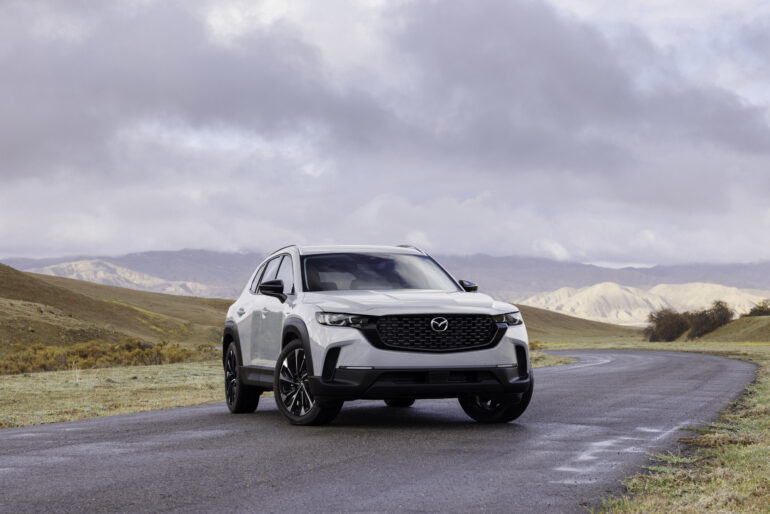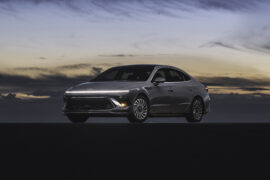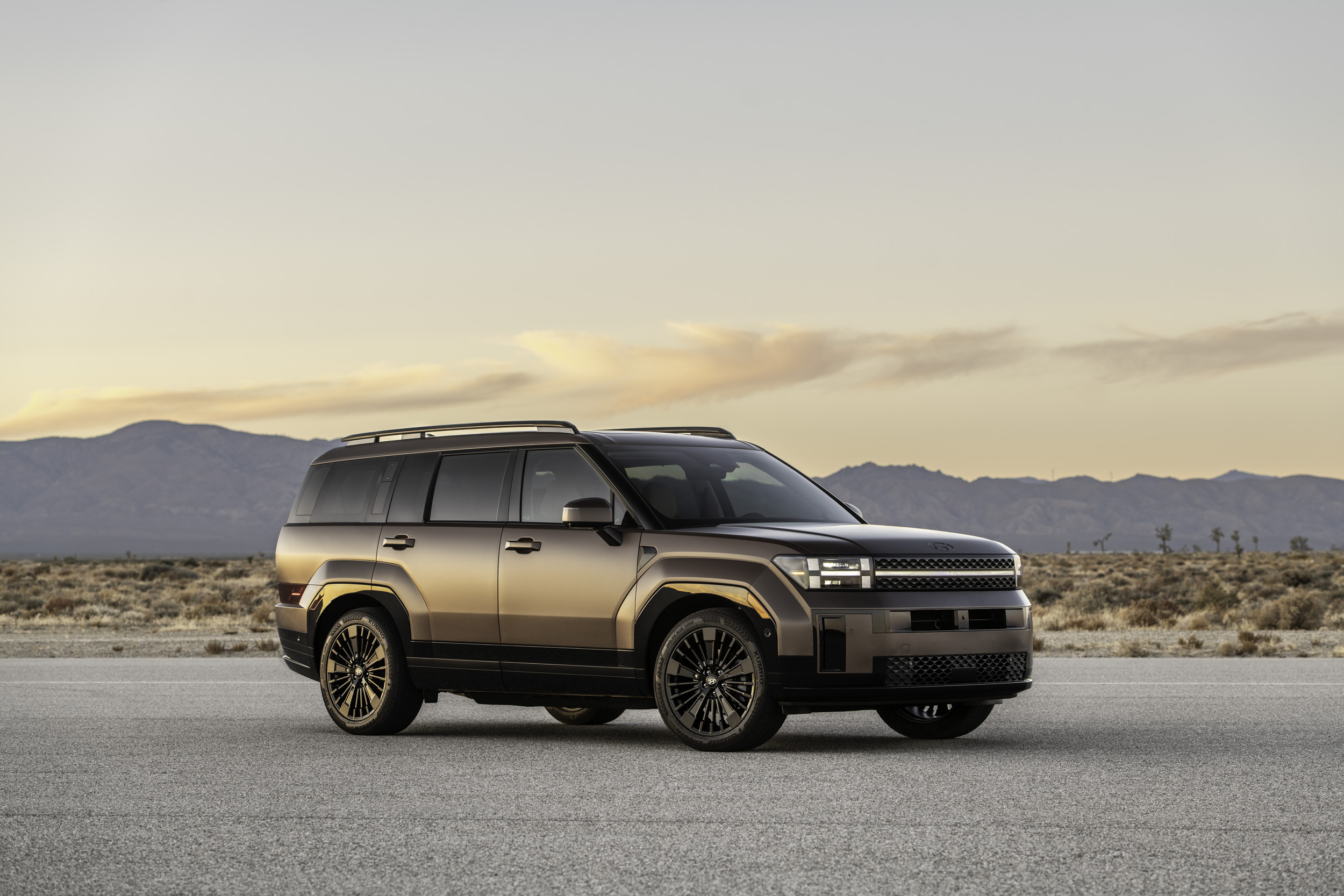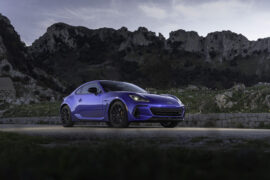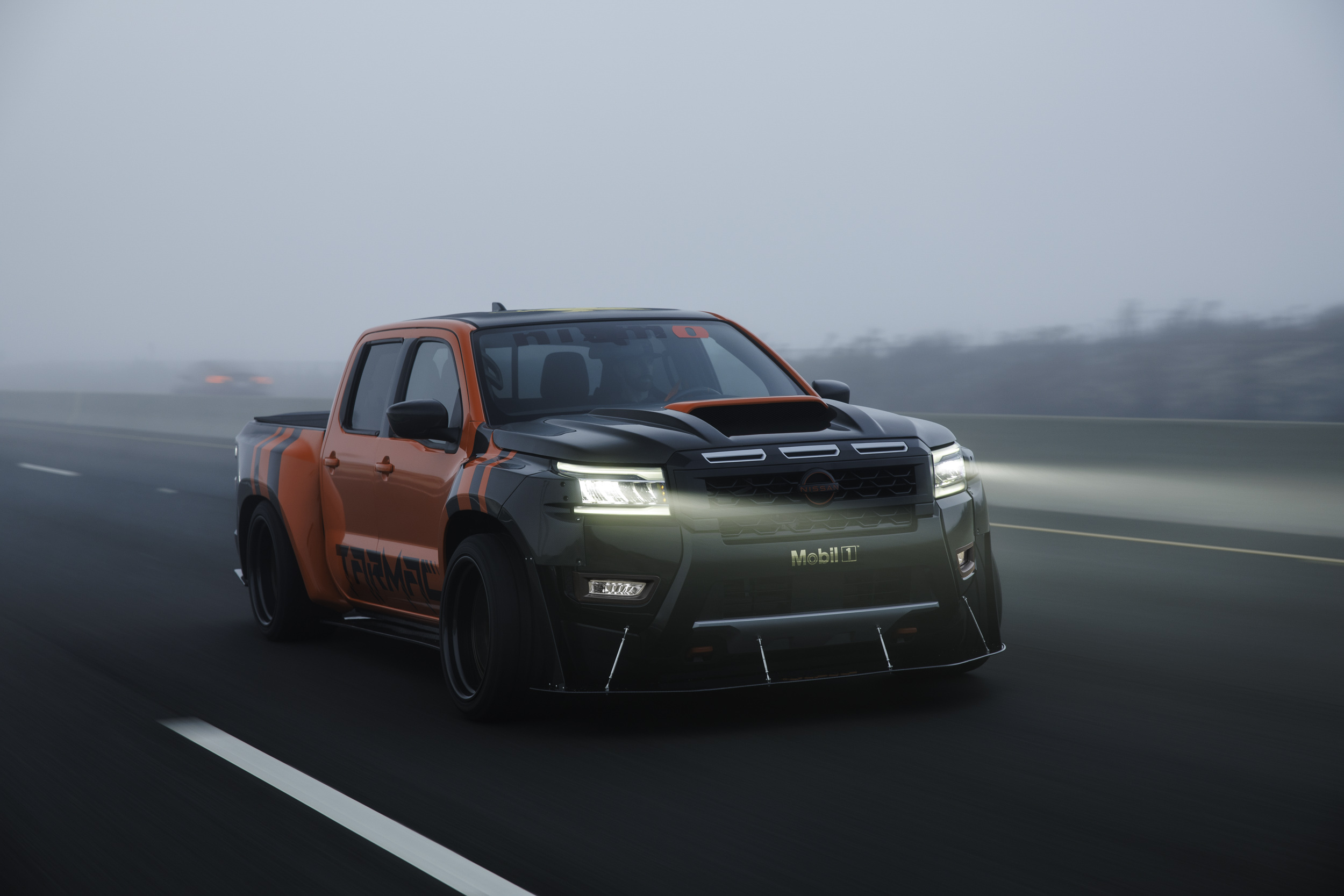Mazda’s 2025 CX-50 stands out as a five-passenger compact crossover, rivaling top contenders like the Toyota RAV4 and Honda CR-V. With its elegant design, refined interior, and a newly offered hybrid powertrain, it offers a stylish and efficient ride. However, its luxury appeal falters with a clunky infotainment system and engine noise that detracts from an otherwise premium experience inside the cabin.
DESIGN
Mazda’s 2025 CX-50 blends its familiar curvaceous design with a few rugged accents, creating a unique but somewhat awkward appearance. While it earns praise for its exterior proportions and interior layout, our test vehicle showcased the Wind Chill Pearl exterior paired with a black and brown cabin. Its rugged additions are evident but don’t overshadow Mazda’s signature refined touches.
Up front, a broad grille and elevated, minimalistic headlights make a bold statement. Large vertical vents complement the faux skidplate beneath, while side black fender flares break from Mazda’s usual design. At the rear, the compact taillights stay in line with the brand’s design philosophy, with larger wheels that suggest adventure but don’t promise off-road capabilities.
Inside, the CX-50’s low dashboard features a 10.3-inch display and minimalistic controls. A large rotary knob on the center console takes care of most infotainment functions. Mazda offers more interior color choices here than on some other models, and, like most SUVs, the CX-50’s best look comes in lighter shades.
PERFORMANCE
The 2025 CX-50 Hybrid combines a 2.5-liter Atkinson-cycle four-cylinder engine and three AC motors, producing 219 horsepower and 163 lb-ft of torque. While these figures sound promising, acceleration in real-world conditions feels lackluster, and the CVT only highlights the uninspiring performance. It’s a drivetrain that gets the job done, but excitement is notably absent.
Power delivery in the CX-50 Hybrid can be uneven, with a slow response and an overall rough sensation. However, fuel efficiency stands out, with my testing yielding 37 mpg—just shy of Mazda’s claim—making it a reliable choice for daily commutes. On the flip side, handling remains sharp and agile, setting it apart from many competitors in this class.
Though acceleration leaves something to be desired, the CX-50 Hybrid shines through tight corners, offering agile steering and impressive balance. It tackles curves with a confident, athletic attitude. Yet, when you demand more power, its limitations become clear—quick handling is fine, but a lack of speed hampers its performance in certain situations.
Mazda’s renowned suspension design is evident in the Hybrid, providing a smooth, comfortable ride. The brakes offer precise feedback, with solid pedal response. Visibility is excellent, making it easy to maneuver in tight spots. While the Hybrid shares much of its handling prowess with the non-hybrid version, the lack of power keeps it from delivering an exhilarating driving experience.
FUEL ECONOMY
Designed with fuel efficiency in mind, the Mazda CX-50 Hybrid prioritizes economy over outright performance. Although official EPA figures are yet to be released, my testing returned an impressive 37 mpg. Drivers focused on fuel savings will find this hybrid satisfying. Mazda’s own estimates of 39 mpg city, 37 mpg highway, and 38 mpg combined align closely with my results, reinforcing its reputation as a smart, fuel-efficient option.
VERDICT
Starting at $40,050, the 2025 Mazda CX-50 Hybrid Premium Plus offers solid value in its class. With just a small $450 premium for the Wind Chill Pearl paint, additional fees are kept to a minimum. The model’s simple pricing structure, combined with a lack of overwhelming optional features, makes it an appealing option for buyers after a well-equipped hybrid without excessive extras.
Competition
While considering the CX-50, it’s worth comparing it to the Toyota RAV4, which now offers a hybrid variant. The CX-50 stands out with its sleek design, but the RAV4 is generally more budget-friendly and offers a more intuitive infotainment system.
Honda’s CR-V hybrid matches well in fuel efficiency and comfort, making it a strong contender. Although Subaru’s Forester lacks a hybrid model, it remains a top off-roading choice with great value.
Nissan’s Rogue impresses with advanced driver-assistance features, though it can feel a bit sluggish in performance. On the other hand, the Volkswagen Tiguan provides a smooth ride and ample space, though it falls short in fuel economy.

